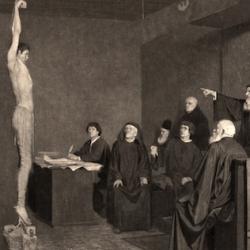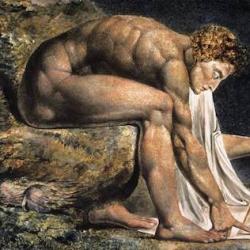According to Heidegger’s essay on modern science, Newton’s theory of motion implied eight fundamental metaphysical shifts. First, because Newton’s theories applied to “every body,” the traditional distinction of heavenly and earthly bodies, and heavenly and earthy motion, “has become obsolete . . . . All natural bodies are essentially of the same kind.”
Second, the priority of circular to linear motion also disappears. Circular motion is no longer considered a cause – i.e., the moon’s circular motion around the earth as a cause of the earth’s rotation. Rather, circular motion is an effect that needs to be explained: Why doesn’t the moon fly off from its path in a straight line, since linear motion is natural.
Third, this implies that distinctions in place also disappear: “Place no longer is where the body belongs according to its inner nature, but only a position in relation to other positions.” Any body can be in any place, and it doesn’t matter.
Fourth, motion isn’t relative to the properties of the body, but the opposite: “the essence of force is determined by the fundamental law of motion” and “every body, left to itself, moves uniformly in a straight line.”
Fifth, motion becomes a measurable reality. It is “seen only as a change of position and relative position, as distances between places,” and thus motion is thought of in terms of distance, of “stretches of the measurable.”
Sixth, as a result, “force” becomes an undifferentiated category. The distinction of natural v. unnatural (violent) force is eliminated: “Impact, for instance, is only a particular form of impressed force, along with pressure and centripetality.”
Seventh, and more broadly, the concept of “nature” changes. It is “no longer the inner principle out of which the motion of the body follows” but “the mode of the variety of the changing relative positions of bodies, the manner in which they are present in space and time, which themselves are domains of possible positional orders and determinations of order.” Space and time are blank screens or empty containers without “special traits.”
Finally, the nature of science changes, since with the change of the concept of nature, “the manner of questioning nature” also changes and even “becomes opposite.” Heidegger may be thinking here, for instance, of the difference between alchemy (which taps into “nature” as a hidden principle) as opposed to chemistry (which examines the changing positions of bodies in space and time).
Assuming that Heidegger is on to something (and I think he is), what is remarkable about this description is how completely we have been Newtonized. It is hard for us to conceive of an alternative account of motion, space, and time, much less to experience it.











